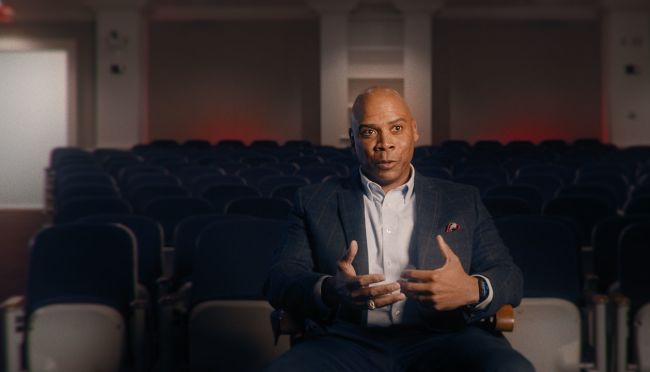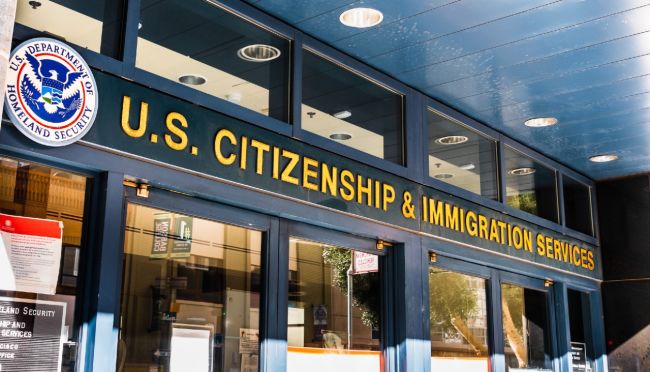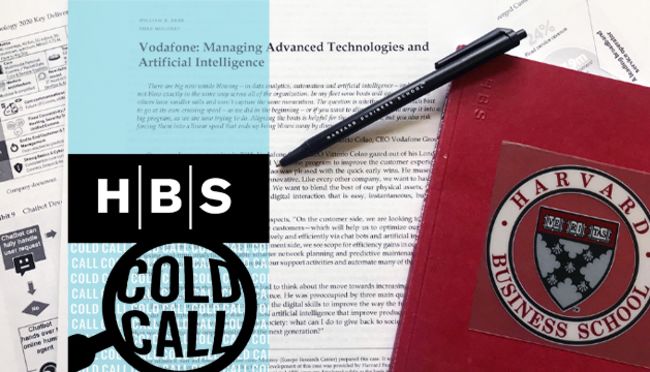Human Capital →
→

- 25 Jan 2024
- Research & Ideas
Being a Team Player: Why College Athletes Succeed in Business
Forget rocks for jocks. A study by Paul Gompers of more than 400,000 Ivy League athletes probes how the rigors of college sports can help people climb the corporate ladder faster and into higher-paying positions.

- 31 May 2023
- HBS Case
Why Business Leaders Need to Hear Larry Miller's Story
VIDEO: Nike executive Larry Miller concealed his criminal past to get a job. What if more companies were willing to hire people with blemishes on their records? Hise Gibson explores why business leaders should give the formerly incarcerated a second chance.

- 01 Nov 2022
- What Do You Think?
Why Aren’t Business Leaders More Vocal About Immigration Policy?
Immigration fuels the American economy, feeds the talent pool, and can directly affect company performance. And yet few executives and entrepreneurs have waded into the policy dialogue, says James Heskett. Open for comment; 0 Comments.

- 04 May 2021
- Cold Call Podcast
Reversing Brain Drain: Moving Talent to Middle America
After decades of brain drain in rural America, Tulsa Remote is working to attract a diverse group of remote workers to live in Tulsa, Oklahoma. The program offers a $10,000 grant to remote workers and entrepreneurs living outside Oklahoma, who relocate to the state’s second largest city for one year, with the goal that they stay longer and truly engage in the community. Professor Prithwiraj “Raj” Choudhury discusses how the Tulsa Remote model provides workers the flexibility to move out of congested cities and explores the challenges in scaling this model throughout rural America and beyond, in his case, “Tulsa Remote: Moving Talent to Middle America.” Open for comment; 0 Comments.

- 03 Dec 2020
- Research & Ideas
Cut Payroll Costs with Transparency, Fairness, and Compassion
As cost-cutting continues across the turbulent economy, companies are challenged to be creative when managing their human capital, say Boris Groysberg and Sarah Abbott. Open for comment; 0 Comments.

- 17 Nov 2020
- Research & Ideas
Why a Blended Workforce May Be Key to Lasting Competitive Advantage
Companies are increasingly blending full-time staff with skilled on-demand talent. The problem: Few companies have developed cultures that accommodate gig workers, says Joseph B. Fuller. Open for comment; 0 Comments.

- 03 Nov 2020
- Working Paper Summaries
The Stock Market Value of Human Capital Creation
Measuring human capital creation is complex but increasingly important to managers for understanding the relationship between employee expenditures and firm performance. This paper develops a strategy to examine aspects of the intangible human capital investment embedded in a firm’s personnel expense. Closed for comment; 0 Comments.

- 20 Oct 2020
- Working Paper Summaries
Flight to Safety: How Economic Downturns Affect Talent Flows to Startups
The COVID-19 crisis makes it more difficult for small, young firms to attract talent as higher-quality candidates turn to more mature firms. Such “flight to safety” leads to a deterioration in the quality of human capital available for startups.

- 12 Jun 2020
- Working Paper Summaries
Corporate Resilience and Response During COVID-19
Investors look for evidence during a market crisis that a company is resilient. This study includes findings that challenge the notion that companies need to adopt practices that hurt their employees because investors want them to do so.

- 29 Jul 2019
- Research & Ideas
How Companies Benefit When Employees Work Remotely
Letting independent workers choose their locations can boost companies, employees, and even the economy, according to research by Prithwiraj Choudhury and colleagues. Open for comment; 0 Comments.

- 25 Oct 2018
- Cold Call Podcast
Vodafone’s Innovative Approach to Advanced Technologies
William Kerr discusses how telecom giant Vodafone incorporated big data, automation, and artificial intelligence to improve productivity while ensuring new opportunities were created for the next generation of workers. Open for comment; 0 Comments.
- 01 Aug 2018
- What Do You Think?
Are Free Trade and Free Markets Quaint Ideas From the Past?
SUMMING UP: Free trade and free markets are great concepts but are often corrupted by politics, globalization, and the relative power of consumers and workers, our readers suggest. Open for comment; 0 Comments.

- 23 Apr 2018
- Research & Ideas
Sponsorship Programs Could Actually Widen the Gender Gap
Companies increasingly provide sponsors to help women get ahead. But certain aspects of sponsorship programs can hinder women instead, according to experimental research by Nancy R. Baldiga and Katherine B. Coffman. Open for comment; 0 Comments.

- 23 Mar 2018
- Working Paper Summaries
Experience Markets: An Application to Outsourcing and Hiring
Online labor platforms are like experience markets. Sellers vary in their fit with individual buyers’ needs while buyers new to the market are uncertain about their own value for what sellers offer. This analysis shows that most potential new employers find the market far less valuable to them than wage differences would suggest.

- 18 Dec 2017
- Op-Ed
Why Employers Must Stop Requiring College Degrees For Middle-Skill Jobs
Employers are guilty of "degree inflation," requiring lofty academic bona fides for jobs that don't really need them. Joseph Fuller says the practice is hurting American competitiveness. Open for comment; 0 Comments.
- 05 Oct 2016
- Research & Ideas
Why Don't More People Get Flu Shots at Work?
The frontline battle station in the just-started influenza season is the workplace flu vaccine clinic. The problem: fewer than half of employees take advantage of them. John Beshears discusses why location makes a difference. Open for comment; 0 Comments.
- 22 Aug 2016
- Research & Ideas
Master the One-on-One Meeting
The one-on-one meeting between supervisor and staff is an invaluable tool for managing, but requires much attention to detail. Julia B. Austin explains best practices for getting the most out of the 1:1. Open for comment; 0 Comments.
- 25 Jul 2016
- Research & Ideas
Who is to Blame for 'The Great Training Robbery'?
Companies spend billions annually training their executives, yet rarely realize all the benefit they could, argue Michael Beer and colleagues. He discusses a new research paper, The Great Training Robbery. Open for comment; 0 Comments.
- 11 Jul 2016
- HBS Case
Neurodiversity: The Benefits of Recruiting Employees with Cognitive Disabilities
Employers are increasingly finding fresh ideas and insights by recruiting workers with Autism Spectrum Disorder and other cognitive disabilities. Gary Pisano and Robert Austin discuss their case study, “SAP SE: Autism at Work.” Open for comment; 0 Comments.

Open Source Software: The $9 Trillion Resource Companies Take for Granted
Many companies build their businesses on open source software, code that would cost firms $8.8 trillion to create from scratch if it weren't freely available. Research by Frank Nagle and colleagues puts a value on an economic necessity that will require investment to meet demand.